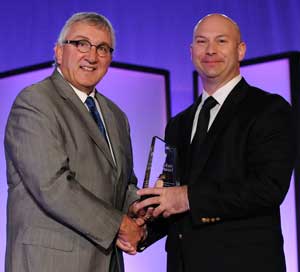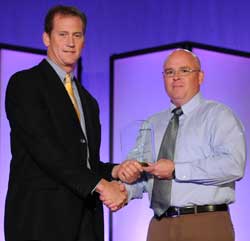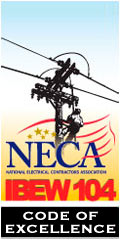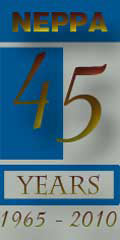NEPPA eNewsletter
July 2010
|
Jonathan Elwell, village manager of Enosburg Falls, Vt., and Jonathan Fitch, general manager of Princeton (Mass.) Municipal Light Department, received the American Public Power Association's Larry Hobart Seven Hats Award at the association's national conference in Orlando, Fla. The award recognizes managers who perform a variety of duties in communities of 2,500 or fewer electric meters. Award recipients have demonstrated accomplishments in seven areas: planning and design, administration, public relations, field supervision, accounting, human resources and community leadership. Princeton Municipal Light Department introduced wind power into its energy portfolio in 1984 and continues to invest in renewable energy. It frequently surveys and responds to customer interest in wind power and has used creative membership marketing strategies to lower the cost of additional wind power investments.
On left, Marc Gerken, 2009-2010 Chair of APPA's Board of Directors and President/CEO, American Municipal Power, Columbus, Ohio, presents Elwell with his award at APPA's National Conference in Orlando, Fla. On right, Jonathan Fitch accepts a Department of Energy Power Wind Award. ##SHARELINKS##
|
|
APPA's 2010 Alan H. Richardson Statesmanship Award was given to William J. Gallagher, the retired general manager of the Vermont Public Power Supply Authority. The award recognizes public power leaders who work successfully and tirelessly on APPA's behalf forging consensus on national issues that achieve public power's goals. Gallagher began his public power career in 1963 and worked continuously in the field for 43 years before retiring in 2006. After becoming general manager of Vermont Public Power Supply Authority in 1990, Gallagher became very active in APPA while serving on the Legislative and Resolutions Committee, the Membership Committee, numerous special committees on retail wheeling and restructuring and APPA's board of directors. ##SHARELINKS##
|
|
When Dan Sack became superintendent of Concord Light in July 1988, the utility's one computer in the tiny office space on Keyes Road near Concord Center represented cutting-edge technology. Deregulation did not affect the electric industry, and most utilities were not involved in complex energy conservation projects. At his retirement more than two decades later, everything about the way wholesale electricity is bought and sold has changed, there's an active project to bring smart grid capabilities to Concord and finding new ways to cut electricity demand is a priority. And that's just some of what Sack's career has covered as he steadily moved Concord Light into the future. "Dan had 22 years of dedicated service and really brought the light plant up to the times, so to speak," said David Wood, who was named acting superintendent in January and is Concord Light's new director. "We wouldn't be where we are today without Dan's vision." Highlights of Sack's career include settling a long-standing rate case with Boston Edison, constructing a 115 KV substation, rebuilding Concord's electric distribution system and completing a consolidated operations center on Elm Street near Route 2. A key achievement was a favorable post-deregulation agreement with Constellation Energy to supply all of the town's power needs from January 2002 through September 2009, a contract that saved the town an estimated $100 million in power supply costs. "As the market went to 5, 6, 7, 11, 12 cents, we were buying at 4.5 cents a kilowatt-hour," Sack said. As prices rose during the contract period, he explained, Concord Light raised prices slightly to create a rate stabilization fund now being used to mitigate market prices. Today, Concord's power supply is more diverse, including renewable energy sources such as wind, hydro, solar and methane. "We have been doing conservation work for 20 years, but we weren't giving it anywhere near the attention we are now," he said. "It makes sense to not have all of your eggs in one basket, and it made sense to buy from renewables." Sack came to Concord from RW Beck Consulting, where he was a partner focusing on rate case litigation. His retirement has been planned for a year to ensure a smooth transition. "I still love the job and I still love the light plant, but I figured 47 years of work were enough, and it was time to sit back and enjoy the other parts of my life a little bit," he said.
Dan Sack retired June 18 after heading Concord Light for 22 years. ##SHARELINKS##
|
|
Mutual Aid: How Does it Work? The NEPPA Mutual Aid Committee met recently to review the new website developed for this important program. Scott Edwards, committee chair, highlighted the features designed to help NEPPA members request and provide assistance to other New England public power systems in times of need. Since many of our members have not participated in a mutual aid event in recent years, it is probably a good time to review basic procedures and protocols which have been established for this program. What is the NEPPA "Mutual Aid Agreement" I have heard about? The "New England Consumer-Owned Utilities Emergency Assistance Agreement" (also referred to as the "NEPPA Aid Agreement") was developed in 1990 by a group of public power systems that wanted to formalize procedures and understandings in the event that "outside assistance" was needed to help restore service after a storm. The agreement contains definitions and guidelines for systems that are either seeking or providing assistance. A copy of the agreement and a summary of its major features are available on the NEPPA mutual aid web (www.neppa.org at the Mutual Aid tab). What is the "FEMA Aid Agreement" I have heard about? The Federal Emergency Management Agency (FEMA) requires any electric utility that seeks federal reimbursement for costs related to restoration of service after a storm or other disaster must have signed a written agreement relating to the provision of assistance from other utilities. For this reason, a simple one-page form was made available to all public power systems to be signed. The American Public Power Association (APPA) has agreed to serve as coordinating organization for the collection of these forms from public power systems around the country. Since the NEPPA Aid Agreement (developed before the FEMA Aid Agreement) already serves this purpose, it is not necessary that a New England public power system sign the FEMA Aid Agreement if it has already signed the NEPPA Aid Agreement. What do I have to do if I need assistance from other systems after a storm? The NEPPA Mutual Aid System has established five regions within New England to coordinate provision of assistance to systems in need. Find your region on the NEPPA Mutual Aid website by clicking on your location in New England. Each region has a designated mutual aid coordinator who is responsible for receiving calls for assistance and contacting nearby utilities to ask if they can provide assistance. So, the simplest way to request assistance is to contact your regional coordinator and tell what type of assistance is needed (nature of emergency, number of line crews needed, equipment, other personnel, etc.) It is then the responsibility of the coordinator to contact other utilities (through a phone network which has already been established) and try to secure the requested assistance. What do I have to do if I want to provide assistance to others after a storm? First, be sure that your utility has accurately listed its contact names and numbers on the NEPPA Mutual Aid website. To do this, simply go to the "Regional Contacts" tab and click on your region and your system name. This will provide a screen that you can fill in to update contact names and numbers. Second, you may contact your regional coordinator during or after a storm or other emergency to advise that your utility is willing to assist other systems by sending crews and equipment if necessary, after which attempts will be made to match up assistance requirements with assistance providers. Who pays for my crews if I send them to another system that requests assistance? Under the NEPPA Aid Agreement, it is the responsibility of the requesting utility to reimburse any assisting utilities for costs incurred. These costs typically include hourly wages of each employee (as provided in existing labor contracts or other wage agreements), meals, lodging, fuel expenses for vehicles and equipment, minor repairs if necessary and reasonable personal expenses such as laundry and telephone. It is also expected the assisting utility will provide a detailed invoice for all expenses within a reasonable period of time following the event, and that invoices will be paid within 30 days of receipt. In addition to fuel costs, can I charge for the use of my equipment if I provide assistance to another utility? The Federal Emergency Management Agency (FEMA) has established a schedule of equipment rates for major disasters and emergencies, which is also included on the NEPPA Mutual Aid website (under the "FEMA Equipment Rates" tab). These rates include all costs associated with equipment use, such as fuel, lubricants, tires, depreciation, etc. In situations where a federal declaration of disaster area has taken place, FEMA will reimburse utilities and contractors for use of specific equipment at hourly rates listed on this schedule. In cases where a federal disaster is not declared and FEMA reimbursements are not involved, assisting utilities typically charge the requesting utility only for fuel costs and minor repairs. Who is liable for any damages that might occur as a result of my crews providing assistance to another system? Under the NEPPA Aid Agreement, utilities that request assistance shall indemnify and hold harmless any utility that provides assistance to them. This indemnification also applies to regional coordinators NEPPA, and the NEPPA Mutual Aid Committee. ##SHARELINKS##
|
|
William A. "Min" Mageau, 75, of Centennial St., Pascoag, died May 28 at Landmark Medical Center. He was the loving husband of Patricia J. (Bowie) Mageau. They were married Nov. 17, 1956. He was a passionate hockey fan. His love of the sport, whether as a participant or spectator, lasted throughout his life. Recent years found him as a proud member of the "Old-Timers, Has-Been & Never Was" team, a group of local gentlemen coming together to play and share their enthusiasm for hockey. ##SHARELINKS##
|
|
The following lineworkers were not recognized in the June article praising New England public power workers for aiding CMLP when high winds and heavy rain caused outages. We apologize for the omission. ##SHARELINKS##
|
|
Jennifer M. Santoro of Belmont has been named energy services and communications coordinator for the Belmont Municipal Light Department (BMLD) with responsibility for promoting and implementing energy conservation programs. Prior to being named, Santoro was associated with BMLD as a public relations intern for more than two years. As an intern, she worked with BMLD management to implement energy conservation programs, promote energy efficiency through bi-monthly publications, develop business relationships and respond to customer inquiries. She will continue to be active in the Municipal Electric Association of Massachusetts. Santoro is a graduate of Lasell College, where she majored in public relations with an additional concentration in business management. She also attended the University of Massachusetts at Boston and majored in business management. She is working toward energy efficiency management certification through the American Public Power Association. "We are pleased to have Jennifer Santoro work with us in this capacity," BMLD Manager Tim Richardson said. "She will draw upon her extensive experience as a BMLD intern to address customer utility and conservation concerns and work as a liaison between the outside energy audit providers and web service providers. Additionally, she will assist BMLD regarding legislative and regulatory developments by researching and applying for federal and state conservation grant programs." ##SHARELINKS##
|
|
NEPPA raised approximately $2,500 at the Benevolent Fund Golf Tournament on June 10 in Westminister. Proceeds from this annual tournament are donated to the New England Public Power Benevolent Fund, established to aid public power employees or their families who are facing financial difficulties due to disabling accidents, extended illness or loss of life. ##SHARELINKS##
|
New England public power officials and operations personnel had an opportunity to learn about new technologies, tools and equipment at NEPPA's 2010 Safety and Operations Conference and Expo in June at Fitchburg, Mass.
The agenda included an opening presentation by Lee Marchessault, president of Workplace Safety Solutions, Inc., and vendor demonstrations throughout the day. The event was followed the next day by a forum on truck safety by Jay Sturm, president, Crane's Aerial Truck Service.

##SHARELINKS##
|
|
Fifteen participants completed the six-session program held May 27 at The Chocksett Inn in Sterling, Mass. It was the second year NEPPA offered the training. The following students completed the program: ##SHARELINKS##
|
|
Lineworker apprentices had skills assessed on June 16-17 at the NEPPA Lineworker's Rodeo, which is part of the Apprentice Lineworker Program. The event was held at the NEPPA Training Facility in Pascoag, R.I. and opened with the playing of the national anthem. Steve Socoby, NEPPA technical trainer, led the group in the pledge of allegiance before apprentices participated in timed exercises including pole top rescue, transformer and cross arm change out. The Pascoag line crews prepared a barbecue lunch including chili and burgers. To view a slide show of the event, click here. ##SHARELINKS##
|
|
By Rockie Blunt, Director of Training and Education Questions included: Whether the session is held on site or off, sometimes we need to retreat to go forward. ##SHARELINKS##
|
|
By Rick Dacri, Dacri & Associates ##SHARELINKS##
|






